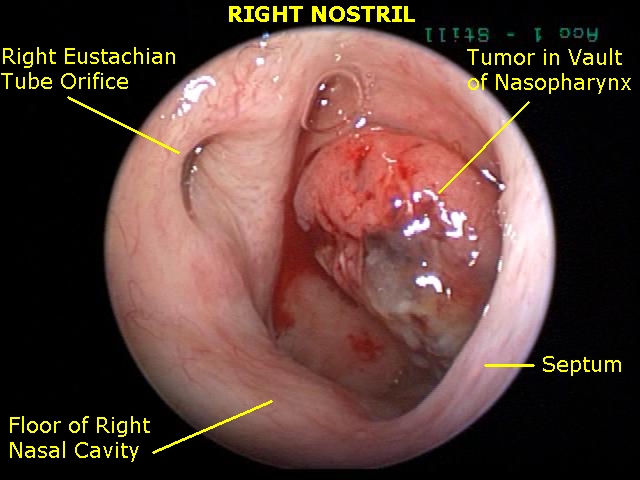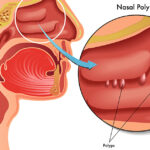Nasopharyngeal carcinoma (NPC) is a rare but aggressive type of head and neck cancer that originates in the nasopharynx, the upper part of the throat behind the nose. Unlike other head and neck cancers, NPC is strongly associated with the Epstein-Barr virus (EBV) and has a distinct geographical prevalence, being more common in Southeast Asia and North Africa.

Causes and Risk Factors
The exact cause of NPC is not fully understood, but several risk factors contribute to its development:
- Epstein-Barr Virus (EBV): Chronic infection with EBV is a primary risk factor.
- Genetic Predisposition: Family history increases susceptibility.
- Dietary Factors: High consumption of salted fish and preserved foods containing nitrosamines.
- Tobacco and Alcohol Use: While not as strongly linked as in other cancers, smoking and heavy alcohol consumption may contribute.
- Occupational Exposure: Inhalation of chemicals like formaldehyde and wood dust may elevate risk.
Symptoms of Nasopharyngeal Carcinoma
NPC symptoms often remain unnoticed in the early stages. Common signs include:
- Persistent nasal congestion or obstruction
- Frequent nosebleeds
- Hearing loss, tinnitus, or ear infections
- Lump in the neck due to lymph node swelling
- Difficulty swallowing
- Frequent headaches
- Facial pain or numbness
Diagnosis of Nasopharyngeal Carcinoma
Diagnosis involves several tests to confirm NPC and determine its extent:
- Nasopharyngoscopy: Direct visualization of the nasopharynx using an endoscope.
- Biopsy: Tissue samples are examined for cancerous cells.
- Imaging Tests: MRI, CT scans, and PET scans assess tumor spread.
- Blood Tests: EBV DNA levels can indicate NPC presence.
Treatment Options
1. Radiation Therapy
Radiotherapy is the primary treatment for NPC. Intensity-Modulated Radiation Therapy (IMRT) targets cancer cells while minimizing damage to healthy tissues.
2. Chemotherapy
Used in combination with radiation (chemoradiotherapy) or for advanced cases. Common drugs include cisplatin and fluorouracil.
3. Targeted Therapy
Drugs like cetuximab target specific cancer cell receptors, improving outcomes in certain cases.
4. Immunotherapy
Emerging treatments using checkpoint inhibitors like pembrolizumab are being explored for NPC management.
5. Surgery
Rarely used due to the nasopharynx’s location, but may be considered in recurrent cases.
Prognosis and Survival Rates
NPC prognosis depends on the stage at diagnosis:
- Early-stage NPC (I-II): 5-year survival rate of 80-90%
- Locally advanced NPC (III): 60-70%
- Metastatic NPC (IV): Below 50%
Prevention Strategies
- Avoid smoking and alcohol abuse
- Maintain a balanced diet low in preserved foods
- Practice good hygiene to reduce EBV exposure
- Routine check-ups if you have a family history of NPC
Nasopharyngeal carcinoma is a challenging cancer requiring early detection for better outcomes. Advancements in radiation therapy, chemotherapy, and emerging immunotherapy offer promising treatment options. Awareness and preventive measures can significantly reduce the risk and improve survival rates.

